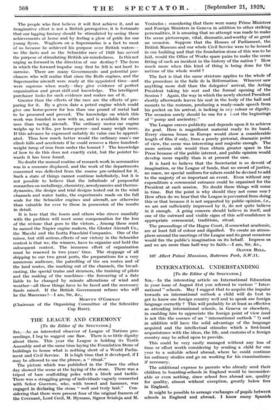THE LEAGUE AND CEREMONY [To the Editor of the SPECTATOR.]
SIR,—As an interested observer of League of Nations pro- ceedings, I beg to suggest one flaw. There is so little dignity about them. This year the League is holding its Tenth Assembly and at the same time laying the Foundation Stone of buildings to house what is nothing short of a World Parlia- ment and Civil Service. It is high time that it developed, if I may be allowed to use the phrase, a " ritual."
The picture which was published in the Times the other day showed the scene at the laying of the stone. There was a tripod of bare scaffolding poles with a block and tackle. There was a straggling group of individuals vaguely connected with Seiior Guerrero, who, with trowel and hammer, was engaged in declaring the stone " well and truly laid." Con- sidering that there were present four of the original framers of the Covenant, Lord Cecil, M. Hymans, Signor Seialoja and M.
Venizelos ; considering that there were many Prime Ministers and Foreign Ministers in Geneva in addition to other striking personalities, it is amazing that no attempt was made to make the scene picturesque, vital, dramatic.and worthy of so great an occasion. Suppose that the Houses of Parliament, the British Museum and our whole Civil Service were to be housed in one building and that the foundation stone of this was to be laid, would the Office of Works spare pains to make the scene fitting of such an incident in the history of the nation ? How much more when this kind of thing is being done for the nations of the whole world ?
The fact is that the same stricture applies to the whole of the procedure in the Salle de la Reformation. Whoever saw anything more dull than the delegates' arrival, the Acting President taking his seat and the formal opening of the Session ? Again, the way in which the newly elected President shortly afterwards leaves his seat in the body of the hall and mounts to the rostrum, producing a ready-made speech from his pocket on his arrival, is lacking in any colour or dignity. The occasion surely should be one for a I:ast the beginnings of " pomp and ancientry."
The League craves publicity and depends upon it to achieve its goal. Here is magnificent material ready to its hand. Every cinema house in Europe would show a considerable length of film if only, from a purely pictorial, dramatic point of view, the scene was interesting and majestic enough. The more serious side would then obtain greater space in the Press because of the public interest, and public opinion would develop more rapidly than is at present the case.
It is hard to believe that the Secretariat is so devoid of imagination, or the League of funds, that no sword of justice, no mace, no special uniform for ushers could be devised to add to the majesty of so important an event. Even without any expenditure a ceremonial entrance could be organized for the President at each session. No doubt these things will come in time. But the point is why should they not come now? How often do we hear that the League is prevented from doing this or that because it is not supported by public opinion, i.e., we are not sufficiently impressed by it, do not quite believe in it enough. A going concern should believe in itself, and one of the outward and visible signs of this self-confidence is appropriate ceremonial, tradition's, ritual.
The proceedings of the Hague Court, it somewhat academic, are at least full of colour and dignified. To create an atmos- phere around the meetings of the League and its great occasions would fire the public's imagination on its behalf. Impress us and we are more than half-way to faith.—I am, Sir, &c., OLIVER BELL. 107 Albert Palace Mansions, Battersea Park, S.W.11.












































 Previous page
Previous page